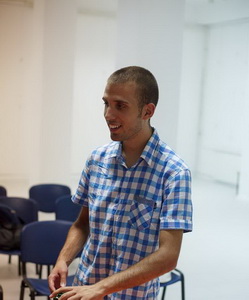 Author: Stefan Lazarević (Social Inclusion Blog)
Author: Stefan Lazarević (Social Inclusion Blog)
I’ve written many times already, in previous posts, about all the things that upset me – when they suddenly cancel a meeting, when they ignore me, i.e. do not respond to messages, when I can’t wait to watch a TV show and the programming suddenly changes, without explanation. I get really upset when there is a power outage. I hate to be without online access. When I was going to school, I was upset by sudden changes to the schedule or unannounced changes of teachers. I find it hard to wait for things – the bus, in a queue in a shop or at the post office, and I find it particularly hard when they tell me that something will happen soon, because I do not know what that means precisely. (…)
I remember such events exactly, I know the day and date they happened, and when I recall them, I immediately feel the same as the first time. This is perhaps why people think that I get upset with no reason, while in fact, I merely recall an earlier unpleasant event. People also sometimes ask me what upset me, and when I explain, they tell me it is not a reason to get upset about. Maybe not for you, but for me it is. Because of a lack of understanding and knowledge various prejudices have arisen about persons with autism.
One of the prejudices about persons with autism is that they are often nervous and upset with no reason. This is not correct. Nobody is ever upset without a reason. The problem is that some children or people who have autism do not speak, and cannot say what exactly happened. Those who do, such as myself, cannot communicate how they feel and how they can be helped when they are angry, nervous, or sad. (…)
Why do people think persons with autism are aggressive? This must be tied to getting upset and the reactions of people who have autism when they get upset and angry. It is just that in such cases they are far more often aggressive towards themselves than towards others. When I was smaller, I sometimes hit my head against the wall or floor, or I bit myself, and others found this very strange, perhaps they were afraid I would hit one of them. (…)
Also, they sometimes say that people who have autism cannot show compassion. Perhaps I cannot always assess how another person feels, but when I hear that someone is nervous, sad about something, sick or angry, I always try not to upset them and to spare them. But it is important for people to tell me how they feel so I would know how to act.
You sometimes hear that all people with autism are geniuses. This is probably because of the special abilities they have. Recently I have watched a short film about Steven Wiltshire, who draws buildings. He can memorize any building he sees, and when he returns home he draws it right away, with all the details – windows, doors, antennae, etc. I heard about some children with autism who never learned to play just sit down by the piano and reproduce any song they hear. Many people with autism can calculate in their head, without pencil and paper, multiply, divide, take the square roots of large numbers. But that does not mean that they are geniuses. It just means that they are highly interested in these things, and that they have special abilities for working on this, while at the same time still having difficulties learning other things and doing everyday tasks.
Others believe that people with autism are stupid. They think this is because we often do not immediately understand what we are expected to do. I sometimes need more time to answer a question. Sometimes it is hard for us to master the simplest things – such as tying my shoelaces. But this does not mean I am stupid.
Please keep in mind that people with autism also differ from one another, just like other people. Perhaps it is hard for you to always understand our actions, and I hope this text can help a little with that.
The text in its entirety can be found at the Social Inclusion Blog.
 Government of the Republic of Serbia
Government of the Republic of Serbia















 pdf [271 KB]
pdf [271 KB]
Leave a Comment